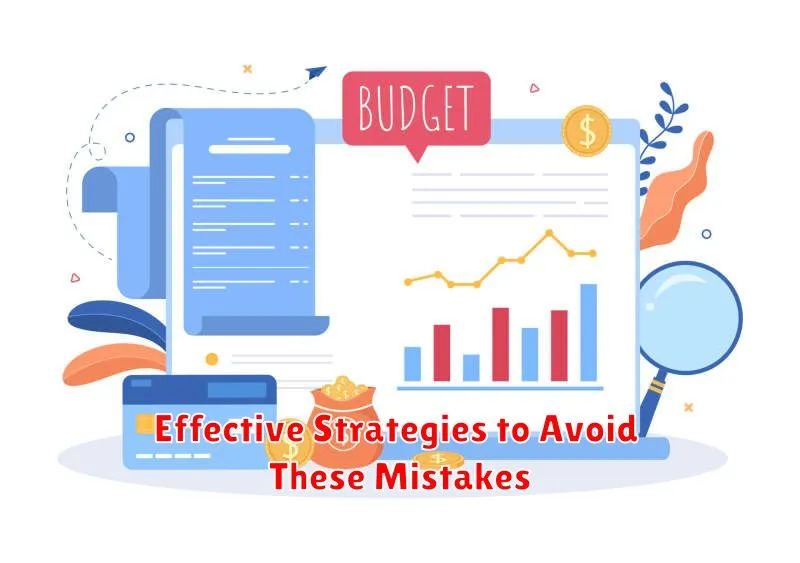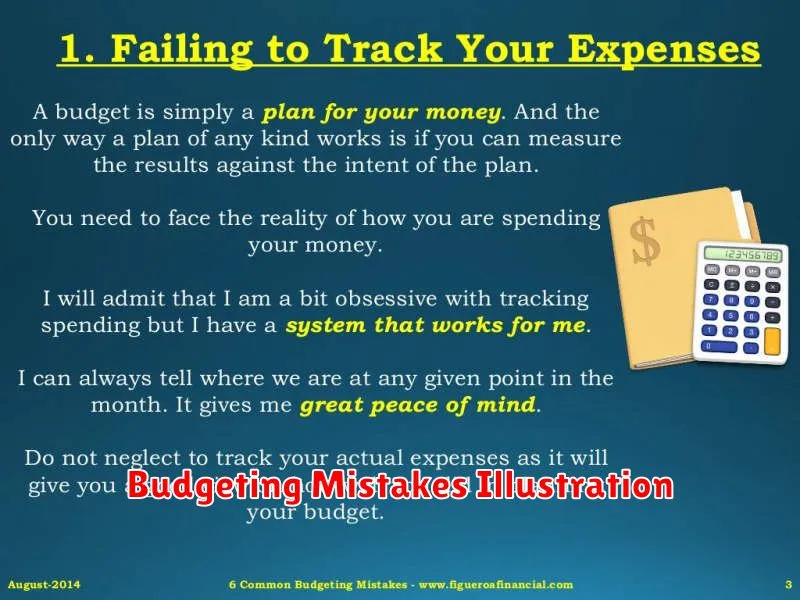Are you tired of constantly feeling broke, even though you’re working hard and making a decent income? You’re not alone. Many people struggle with managing their finances, making common budgeting mistakes that can derail their financial goals. From overspending on unnecessary things to failing to track expenses, these mistakes can lead to debt, stress, and a feeling of being stuck.
But don’t worry, there’s hope! By understanding the most common budgeting errors and learning how to avoid them, you can take control of your finances and achieve financial freedom. This article will delve into the top budgeting mistakes people make and provide actionable steps to help you build a solid financial foundation. Let’s explore how you can finally break free from financial struggles and start living a more secure and stress-free life.
Why Budgeting is Crucial for Financial Health
In the realm of personal finance, budgeting emerges as a cornerstone practice that empowers individuals to achieve financial well-being. It is the process of meticulously planning how to allocate your income and expenses, ensuring that you stay on track with your financial goals. While budgeting may seem like a daunting task, it offers numerous benefits that significantly enhance your financial health.
1. Gaining Clarity and Control
Budgeting provides a clear picture of your financial situation, allowing you to understand where your money is going. It helps you identify areas of unnecessary spending and empowers you to make conscious decisions about your expenses. By tracking your income and expenses, you gain control over your finances and prevent impulsive purchases.
2. Setting and Achieving Financial Goals
Budgeting is essential for setting and achieving financial goals, whether it’s saving for a down payment on a house, paying off debt, or investing for retirement. By allocating funds specifically for these goals, you create a roadmap that guides you towards financial success. Regular monitoring and adjustments to your budget ensure that you stay on track and achieve your aspirations.
3. Reducing Debt and Financial Stress
Budgeting plays a crucial role in debt reduction by helping you prioritize debt payments and allocate funds effectively. It enables you to develop a clear debt repayment strategy and track your progress, reducing financial stress and freeing up more income for other priorities.
4. Building an Emergency Fund
Life is unpredictable, and unexpected expenses can arise at any time. An emergency fund provides a financial safety net to cover these unforeseen events, preventing financial instability and ensuring peace of mind. Budgeting allows you to allocate a portion of your income towards building an emergency fund, creating a buffer to handle life’s curveballs.
5. Investing for the Future
Budgeting empowers you to invest for your future by freeing up funds for investments. By allocating a specific portion of your income to investments, you create a foundation for long-term financial security and wealth accumulation.
Conclusion
Budgeting is a powerful tool that empowers individuals to take control of their finances, achieve financial goals, and achieve financial well-being. By incorporating budgeting into your financial routine, you can gain clarity, reduce debt, build an emergency fund, and invest for a secure future. Embrace the power of budgeting and unlock your financial potential.
Common Budgeting Pitfalls to Watch Out For

Budgeting is an essential part of managing your finances, but it’s not always easy. Even the most meticulous budgeters can fall prey to common pitfalls that can derail their financial goals. By being aware of these pitfalls, you can take steps to avoid them and stay on track with your budget.
1. Not Tracking Your Spending
One of the most common budgeting mistakes is failing to track your spending. If you don’t know where your money is going, it’s difficult to create a realistic budget or identify areas where you can cut back. There are many ways to track your spending, such as using a budgeting app, a spreadsheet, or even a simple notebook. The key is to be consistent and track every expense, no matter how small.
2. Overestimating Your Income
It’s easy to get carried away and overestimate your income when creating a budget. Don’t forget to factor in taxes, deductions, and other expenses that could reduce your take-home pay. It’s better to underestimate your income and overestimate your expenses to avoid surprises and ensure you have enough money to cover your bills.
3. Underestimating Your Expenses
Just like overestimating your income, underestimating your expenses can throw your budget off track. Be sure to include all of your regular expenses, as well as any potential unexpected costs, such as car repairs or medical bills. It’s always better to overestimate your expenses and have some extra money left over than to be caught short.
4. Not Adjusting Your Budget
Life is full of changes, and your budget should reflect those changes. If your income or expenses change, don’t be afraid to adjust your budget accordingly. For example, if you get a raise, you may want to increase your savings contributions. Or, if you lose your job, you’ll need to cut back on spending to make ends meet.
5. Not Having an Emergency Fund
An emergency fund is essential for any budget. It provides a safety net for unexpected expenses, such as medical bills, car repairs, or job loss. Aim to save 3-6 months’ worth of living expenses in an emergency fund. This will give you peace of mind and help you avoid going into debt if something unexpected happens.
6. Living Beyond Your Means
One of the biggest budgeting pitfalls is living beyond your means. This can lead to debt, stress, and financial instability. If you’re constantly struggling to make ends meet, it’s time to take a hard look at your spending habits and make some changes. Start by identifying areas where you can cut back and prioritize your spending on essentials.
7. Not Setting Financial Goals
It’s important to have financial goals in mind when creating a budget. Without goals, it can be difficult to stay motivated and track your progress. Set realistic goals, such as saving for a down payment on a house, paying off debt, or investing for retirement. Having goals will give you a clear direction and help you make informed financial decisions.
8. Giving Up Too Easily
Budgeting takes time, effort, and discipline. Don’t give up too easily if you make a mistake or slip up. Everyone makes mistakes, but the key is to learn from them and keep trying. It’s important to be patient and persistent with your budgeting efforts. Over time, you’ll develop good financial habits and achieve your financial goals.
By being aware of these common budgeting pitfalls, you can take steps to avoid them and create a sustainable budget that will help you reach your financial goals. Remember to be realistic, consistent, and adaptable with your budget, and don’t be afraid to seek help from a financial advisor if you need guidance.
Not Tracking Spending Effectively
Are you tired of constantly feeling like you’re running out of money, despite your best efforts? It’s a common problem, and one that can be solved by simply tracking your spending effectively. Without accurate knowledge of where your money is going, it’s impossible to make informed decisions about your finances.
Many people fall into the trap of thinking they know how much they spend, only to be shocked when they finally take a close look at their bank statements. It’s easy to underestimate the small, everyday expenses that add up over time. Even a daily latte or a few extra trips to the grocery store can make a significant difference in your budget.
Here are some key reasons why you might not be tracking your spending effectively:
- Lack of a Budget: Without a clear budget, it’s difficult to know what you should be spending and where you can cut back.
- Not Using a Tracking Tool: There are many fantastic budgeting and spending tracking apps available, but many people simply rely on their memories or rough estimates.
- Inconsistent Tracking: Even if you do start tracking, if you’re not consistent, the data will be incomplete and unreliable.
- Ignoring Small Expenses: It’s easy to overlook small purchases, but these often add up to a significant amount over time.
The good news is that it’s never too late to start tracking your spending effectively. By taking a closer look at your finances, you can gain control over your money, identify areas where you can save, and achieve your financial goals.
Setting Unrealistic Budget Goals
Setting a budget is a crucial step in managing your finances effectively. However, it’s equally important to ensure that your budget goals are realistic and achievable. Setting unrealistic goals can lead to frustration, disappointment, and ultimately, failure to reach your financial objectives.
One common mistake is setting overly ambitious savings targets. While aiming high is admirable, it’s essential to consider your current income and expenses. If your savings goal is significantly higher than your disposable income, it’s likely to be unsustainable in the long run.
Another pitfall is failing to account for unexpected expenses. Life is full of surprises, and it’s wise to factor in a buffer for unforeseen events. This could include car repairs, medical bills, or home maintenance.
Moreover, setting rigid budget restrictions can backfire. When you create a budget that leaves no room for flexibility, you may find yourself feeling deprived or tempted to overspend when you encounter a tempting opportunity.
Instead of setting unrealistic goals, consider the following tips:
- Start small: Set modest savings goals that you can realistically achieve. As you gain momentum and develop better financial habits, you can gradually increase your targets.
- Track your expenses: Monitor your spending habits to identify areas where you can cut back.
- Prioritize: Determine your financial priorities and allocate your resources accordingly.
- Be flexible: Allow some wiggle room in your budget for unexpected events and occasional indulgences.
Remember, a successful budget is one that you can stick to consistently. By setting realistic goals and maintaining a flexible approach, you can achieve your financial aspirations and build a secure financial future.
Ignoring Small, Recurring Expenses
It’s easy to ignore small, recurring expenses. After all, they only cost a few dollars each. But over time, these small expenses can add up to a significant amount of money. For example, if you spend $5 a day on coffee, that’s $150 a month or $1,800 a year. That’s a lot of money you could be saving!
There are a few ways to track your small, recurring expenses:
- Use a budgeting app: Many budgeting apps allow you to track your spending by category. This can help you see where your money is going and identify any areas where you can cut back.
- Create a spreadsheet: You can create a simple spreadsheet to track your expenses. This will allow you to see how much you’re spending on different categories over time.
- Keep receipts: This may seem like a lot of work, but it’s a good way to track your spending. You can then use this information to create a budget or analyze your spending habits.
Once you’ve tracked your small, recurring expenses, you can start to make some changes. Here are a few ideas:
- Cut back on your spending: You may not be able to eliminate all of your small, recurring expenses, but you can probably cut back on some of them. For example, if you buy a latte every day, try making your coffee at home a few days a week.
- Negotiate your bills: Many companies are willing to negotiate lower rates for their services. You may be able to save money on your cable bill, internet bill, or phone bill by calling and asking for a discount.
- Find cheaper alternatives: There are often cheaper alternatives to the products and services you use. For example, you can often find cheaper groceries at discount stores or online.
By taking the time to track and reduce your small, recurring expenses, you can save a significant amount of money over time. This money can then be used to reach your financial goals, such as paying off debt, saving for retirement, or investing.
Lack of Emergency Fund Planning
An emergency fund is a crucial part of any financial plan. It is a safety net that can help you cover unexpected expenses, such as medical bills, car repairs, or job loss. Without an emergency fund, you may be forced to borrow money at high interest rates or sell assets at a loss.
According to a recent survey, only 39% of Americans have enough saved to cover a $1,000 emergency. This means that a significant portion of the population is vulnerable to financial hardship if an unexpected event occurs.
There are several reasons why people may not have an emergency fund. Some people may simply not be aware of its importance. Others may have other financial priorities, such as paying off debt or saving for retirement. Still, others may simply not have enough money to save.
No matter the reason, it is essential to start planning for an emergency fund today. Even if you can only save a small amount each month, it will add up over time.
Here are some tips for building an emergency fund:
- Set a goal. Decide how much money you want to save in your emergency fund. A good goal is to have three to six months’ worth of living expenses.
- Automate your savings. Set up automatic transfers from your checking account to your savings account. This will help you save consistently without having to think about it.
- Look for ways to cut expenses. Find ways to reduce your spending, such as eating out less, canceling unnecessary subscriptions, or finding cheaper alternatives.
- Use a high-yield savings account. This will help your money grow faster.
An emergency fund is essential for financial security. It can help you avoid debt, stress, and financial hardship. Take the time to plan for an emergency fund today and you will be glad you did.
Impulse Purchases and Lifestyle Creep

Impulse purchases are unplanned, often emotional, spending decisions. They can range from a spontaneous coffee purchase to a big-ticket item like a new car. While the occasional impulse buy is harmless, consistent impulse purchases can contribute to a phenomenon called “lifestyle creep.”
Lifestyle creep refers to the gradual increase in spending over time as your income rises. As you earn more, you might find yourself upgrading your living standards, indulging in more luxuries, and spending more on experiences. This can lead to a vicious cycle, where you constantly need to earn more to maintain your elevated lifestyle.
Impulse purchases often play a role in lifestyle creep. You might see a new gadget advertised and impulsively decide to buy it, even though you didn’t budget for it. Or, you might feel pressured to keep up with your peers and their spending habits, leading to unnecessary purchases.
How to Avoid Impulse Purchases and Combat Lifestyle Creep
Here are some strategies to combat impulse purchases and prevent lifestyle creep:
- Create a budget and stick to it: This involves tracking your income and expenses to identify areas where you can cut back.
- Practice the “24-hour rule”: Before making a significant purchase, wait 24 hours. This gives you time to cool down and assess if the purchase is truly necessary.
- Unsubscribe from marketing emails: These emails are often designed to trigger impulse buys. Unubscribe to avoid temptation.
- Shop with a list: Create a shopping list for groceries and other essentials, and avoid straying from it to prevent impulse purchases.
- Practice gratitude: Focus on the things you already have instead of what you don’t. This can help shift your mindset and make you less prone to impulse buying.
- Set financial goals: Having a clear financial goal, such as saving for retirement or a down payment on a house, can help you prioritize your spending and avoid unnecessary purchases.
By taking steps to avoid impulse purchases and manage your spending, you can break the cycle of lifestyle creep and achieve greater financial security. It’s important to remember that true happiness is not found in material possessions but in experiences, relationships, and personal fulfillment.
Overspending on Fixed Expenses
Fixed expenses are costs that remain relatively consistent each month, such as rent, mortgage payments, insurance premiums, and subscriptions. While these expenses are often predictable, they can also be a major source of overspending if not carefully managed.
One common reason for overspending on fixed expenses is simply not knowing where your money is going. Many people don’t track their spending closely, which can lead to surprises when it comes to how much is being spent on fixed costs.
Another reason for overspending on fixed expenses is that these costs can creep up over time. For example, your rent or mortgage payment may have increased since you first signed your lease or mortgage. Or, you may have added new subscriptions or memberships without realizing the impact on your budget.
To avoid overspending on fixed expenses, it’s important to:
- Track your spending: Keep track of all your fixed expenses so you know exactly where your money is going.
- Budget for fixed expenses: Include all of your fixed expenses in your budget, and make sure you have enough money to cover them each month.
- Negotiate lower rates: See if you can negotiate lower rates for your rent, mortgage, insurance, or other fixed expenses.
- Shop around for better deals: Compare prices from different providers for your fixed expenses to see if you can find a better deal.
- Cancel unnecessary subscriptions: Take a look at your subscriptions and memberships and cancel any that you don’t use or need.
By taking steps to manage your fixed expenses, you can free up more money to save, invest, or spend on other things you enjoy.
Not Adjusting Your Budget Regularly
A budget is a plan for how you will spend your money. It should be based on your income and expenses, and it should be updated regularly to reflect changes in your financial situation.
If you don’t adjust your budget regularly, you could end up overspending and getting into debt. You may also miss out on opportunities to save money or invest.
Here are some reasons why you should adjust your budget regularly:
- Changes in income: If you get a raise or a promotion, you’ll need to update your budget to reflect your new income. Likewise, if you lose your job or experience a pay cut, you’ll need to adjust your spending habits to match your lower income.
- Changes in expenses: Your expenses can fluctuate over time. For example, you might have to spend more money on groceries if food prices go up or on transportation if gas prices increase. You might also have unexpected expenses, such as medical bills or car repairs.
- Changes in financial goals: Your financial goals can change over time. For example, you might decide to save for a down payment on a house or pay off your student loans. You’ll need to adjust your budget to reflect these new goals.
It’s a good idea to review your budget at least once a year, and more often if you experience a major life change, such as a job change, marriage, or birth of a child.
Here are some tips for adjusting your budget:
- Track your spending: The first step to adjusting your budget is to track your spending. This will help you see where your money is going and identify areas where you can cut back.
- Review your expenses: Once you’ve tracked your spending, it’s time to review your expenses and see if there are any areas where you can cut back.
- Set realistic goals: When you’re adjusting your budget, it’s important to set realistic goals. Don’t try to cut back on too much too quickly, or you’ll likely end up giving up.
- Make gradual changes: Instead of making drastic changes to your budget all at once, make gradual changes over time. This will help you adjust to your new spending habits more easily.
Adjusting your budget regularly can help you stay on track financially. It’s one of the most important things you can do to ensure that you’re spending within your means and achieving your financial goals.
Effective Strategies to Avoid These Mistakes

Here is some content that I want to write about. It should be formatted using the tags you requested.
This paragraph includes a key word that should be bolded.

